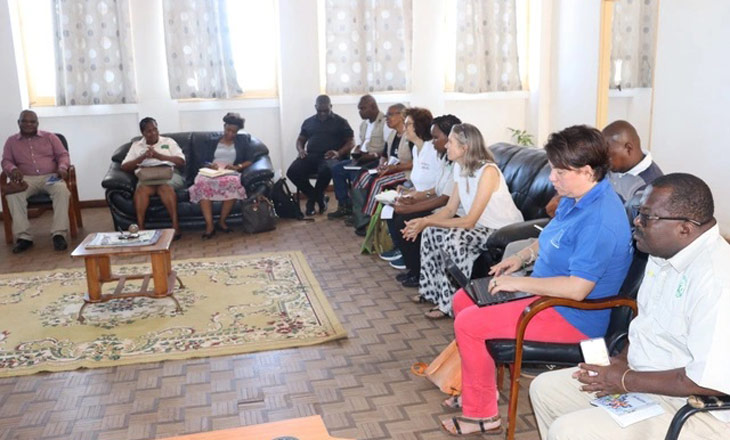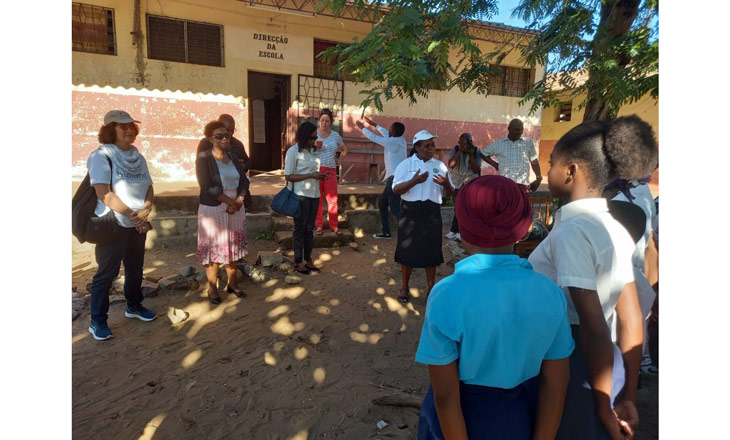From May 19 to 23, the joint monitoring mission of the PROMOVE Biodiversidade Programme took place in the Primeiras and Segundas Islands Environmental Protection Area (APAIPS), in Nampula Province.
Published at 02/06/2025
Joint Monitoring Mission of PROMOVE Biodiversidade Strengthens Conservation and Sustainable Development in the Primeiras and Segundas Islands
For five days, a multisectoral team toured the region – Nampula City, Angoche, and Moma – to assess the progress of implemented activities, the degree of achievement of results, and to reinforce the commitment towards effective biodiversity conservation and the sustainable development of local communities.
The mission, led by the Officer of the National Authorizing Office (GON), brought together representatives from the National Administration of Conservation Areas (ANAC) and APAIPS Administration, the European Union (EU), the Director of Programmes of the Foundation for the Conservation of Biodiversity (BIOFUND), the Coordinator of the PROMOVE Biodiversidade Programme (BIOFUND), and the implementing partner, the consortium led by the World Wide Fund for Nature (WWF) with KULIMA and AENA.
In Nampula City, mission members met with the Secretary of State and the Provincial Directorate of Agriculture and Fisheries, who emphasized the need to align environmental conservation with sustainable development, ensuring direct benefits to communities. Initiatives such as support for offshore fishing, quaculture, nutrition education, and improvement of access roads notably the Nametil–Angoche road currently under construction with EU support were highlighted.
In Angoche and Moma, the mission met with district authorities who reiterated their commitment to conservation and community development, highlighting actions such as joint enforcement, mangrove restoration, and studies on payment for environmental services (e.g., carbon credits). This was followed by visits to beneficiary communities, including Pulizica, Mucoroje, Mucucune, Corane, and Mafamede Island, where enforcement challenges were identified. In Angoche the the mission visited good practices in environmental education led by children. Community initiatives combining conservation and income generation were also presented:
- Fish processing infrastructure – washing tanks, salting, drying racks, and fish freezing facilities under construction in Pulizica and Mucoroje, with technical support provided by Kulima and WWF;
- Crab fattening – experimental cages that increase the product’s value before sale, supported by WWF;
- Improved beekeeping – sustainable hives installed in mangroves, with training provided by WWF in partnership with a private company, promoting honey production for income generation and ecosystem protection;
- Vegetable production greenhouse in the Mucucune community – the construction of a water storage tank, water pumping from the river, and sprinkler irrigation powered by solar energy aims to produce seedlings for the members of the greenhouse management group and for sale in the community, generating income and contributing to the inclusion of vegetables in their diet;
- Protection of the Pulizica and Corane sanctuaries – the common understanding among communities is their importance for increasing productivity; however, they still do not fully refrain from illegal activities. Monitors are callingfor incentives! The challenge lies in defining the type of incentives, their sustainability, and the role of the community as beneficiary in offering such incentives, among others;
- Management-oriented monitoring – this involves SMOG agents, community agents, and monitors who, on one hand, record data on illegal activities in the sanctuaries and along the coast, while others raise awareness among offenders to help them understand the benefit of preserving fish breeding grounds for increased catches.
These initiatives are funded by the European Union under the PROMOVE Biodiversidade programme and demonstrate sustainable livelihood alternatives that can help reduce pressure on marine resources. However, their economic and financial viability, tangible benefits, and scalability still deserve the attention of the partners involved in this action!
The mission highlighted that conservation and development must move forward together, requiring the active involvement of communities, government, and the private sector. To ensure impact and sustainability, it is essential to improve access and invest in basic infrastructure (water, energy, health, and education). PROMOVE Biodiversidade has been strengthening the protection of the Primeiras and Segundas Islands and investing in the future of the communities that depend on them. But the scale must be greater to achieve effective transformation!




